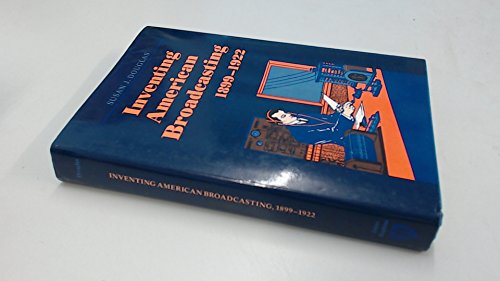Inventing American Broadcasting, 1899-1922 (Johns Hopkins Studies in the History of Technology)
Professor Susan J. Douglas
BOOK REVIEW

The dawn of American broadcasting was no mere chance; it was a riveting saga full of ambition, chaos, and innovation. In Inventing American Broadcasting, 1899-1922, Professor Susan J. Douglas delves deep into the enigmatic birth of a technology that has since transformed the very fabric of society. This isn't just a book; it's a time machine that propels you into the hearts and minds of pioneers who played pivotal roles in urging our nation toward a communicative renaissance. 🌟
From the moment you pick up this influential work, you're thrust into a world where commercialism and creativity clash with ideals of public service and democracy. Douglas meticulously chronicles how broadcasting blossomed during those formative years, shedding light on figures like Guglielmo Marconi and Lee de Forest-men whose ambitions shaped the airwaves we take for granted today. But don't be mistaken. This narrative is rich with tension and intrigue, highlighting the compromises and ethical dilemmas that the burgeoning field faced. 📻
Gripping and sincere, Douglas's writing invites you to reflect on the societal impacts of broadcasting-an evolution that birthed a medium not just meant to entertain, but also to bond and inform a diverse populace. As the waves crackled with new voices, the nation found itself catching a glimpse of new realities, ideas, and even contradictions. That familiar voice echoing through your living room wasn't merely broadcasting entertainment; it was crafting cultural narratives and influencing public opinion during tumultuous times.
The backdrop is as captivating as the tale itself. Post-19th century America was a hotbed for transformation. The nation grappled with social upheaval, economic changes, and World War I's shadow looming large. Broadcasting was both a reflection and a catalyst for change-a mirror that reflected society while simultaneously shaping it in unpredictable ways. Douglas contextualizes the evolution of broadcasting within this broader socio-political framework, invoking emotions ranging from nationalism to skepticism.
Readers have been vocal about their experiences with this transformative work. Some praise its comprehensive research and thought-provoking analysis, captivated by Douglas's ability to weave historical facts with a narrative flair. Others, however, find themselves wrestling with the sheer depth of information presented-a testament to its scholarly rigor but also a barrier for casual readers. Tension between praise and critique runs through many reviews, underscoring both the richness of the subject matter and the challenges of digesting its full implications. 📚
But the power of Inventing American Broadcasting lies not solely in its historical recounting; it serves as a clarion call for us, the audience of today, to engage critically with media that floods our lives. As you navigate through Douglas's exploration, you'll feel compelled to judge your own relationship with media consumption and the implications of technology in shaping public discourse. What are we losing in this modern era of incessant connectivity? What truths have been muffled, and what narratives have been sculpted by commercial interests in the modern reign of broadcast media?
Take a moment to reflect: Broadcasting is more than just a channel number or a click of a button. It's a vital thread in the fabric of American democracy and identity. Douglas offers not just a history lesson but a gripping invitation to dissect these threads and understand how they wield power. The choices made by the creators of early broadcasting were not just about technology; they were about who gets to speak and who gets to listen, shaping the very landscape of community and conversation.
In a world where media is often seen as a monolith-a unified bloc of channels and streaming services-Douglas's work compels you to peel back the layers and examine its rich, often messy origins. With its potent blend of history, sociology, and cultural critique, Inventing American Broadcasting is essential reading not just for media scholars but for anyone who dares to think critically about the tools we use to communicate today. Embrace the journey that Susan J. Douglas offers; you won't regret diving into the electrifying waters of American broadcasting's past. The echoes of those early broadcasts might just illuminate unexpected truths about our present. 🌊
📖 Inventing American Broadcasting, 1899-1922 (Johns Hopkins Studies in the History of Technology)
✍ by Professor Susan J. Douglas
🧾 400 pages
1987
#inventing #american #broadcasting #1899 #1922 #johns #hopkins #studies #history #technology #professor #susan #douglas #ProfessorSusanJDouglas